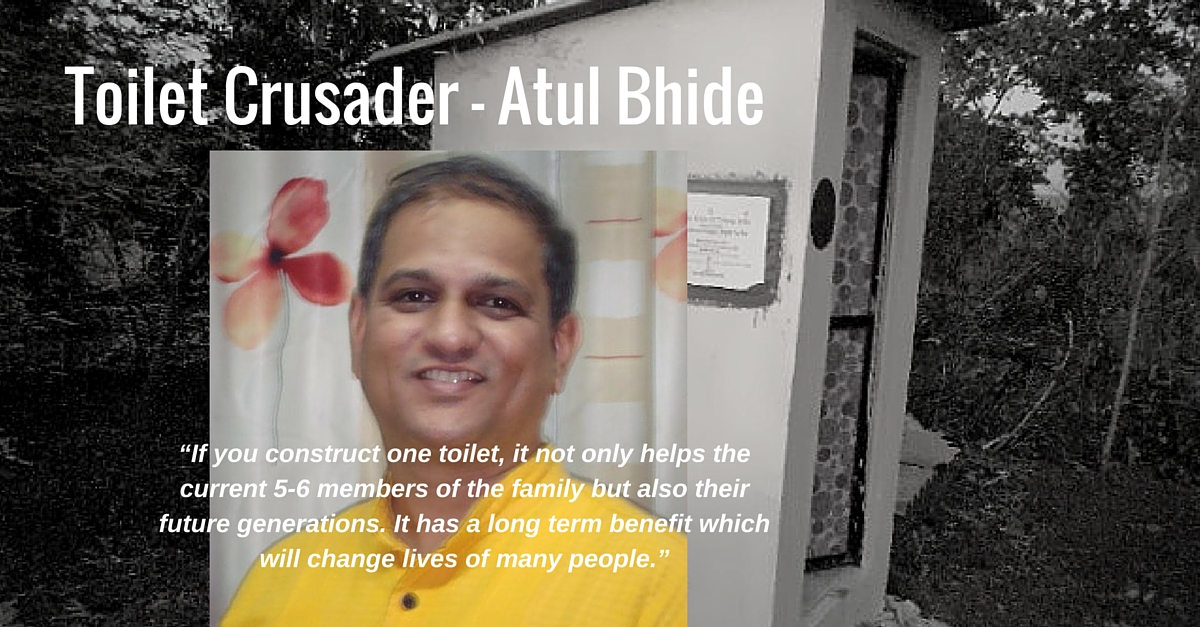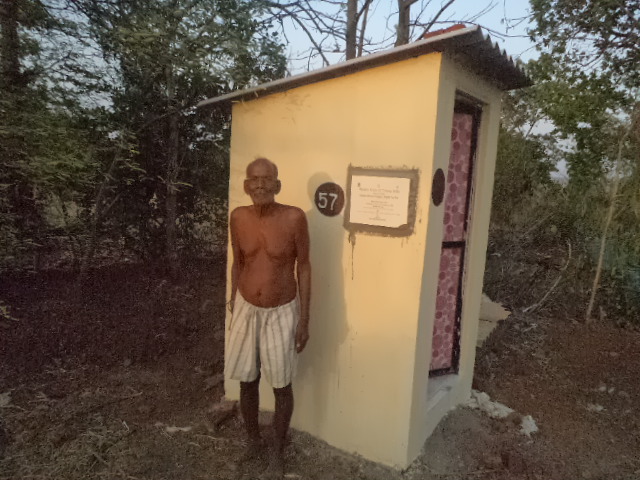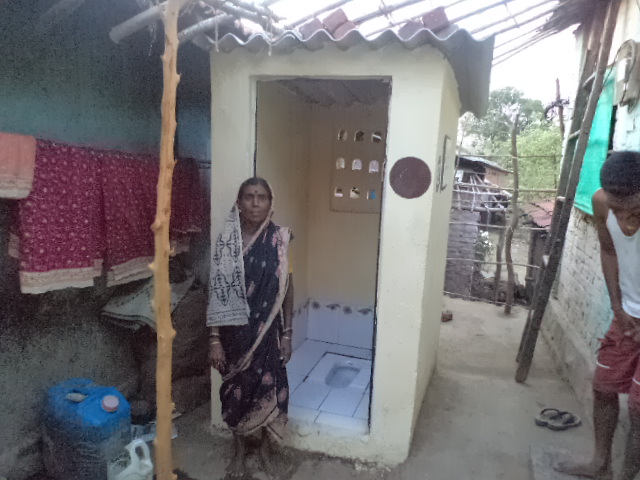He Is Leading Rural India To A Healthier Tomorrow – One Toilet At A Time
A rural village near Mumbai had no toilets until Atul Bhide came and constructed over 200 of them. In the alarming situation where people in India have mobile phones but not toilets, we need more such heroes who are trying to make a change at grassroot level. Read his story of change and how he did it.

A village near Mumbai had no toilets until Atul Bhide came and constructed over 200 of them. In the alarming situation where people in India have mobile phones but not toilets, we need more such heroes who are trying to make a change at grassroot level. Read his story of change and how he did it.
Did you know that 626 million people in the India — the highest in the world — defecate in the open as they don’t have a toilet? The grim reality is that while India is ranked as the third largest internet user in the world showing its technological advancement, a majority of the country’s population still doesn’t have access to proper sanitation.
A small village Sogav located 80 kms from Mumbai witnessed a daily scenario of people defecating in public due to unavailability of toilets in their houses.
There are many who would just shrug their shoulders and shake their heads and move on with their lives after cursing the government for everything. Then there are those who take matters in their own hands and try to change the situation. Atul Bhide is one such person who tried to improve the unhygienic condition of Sogav village.

An entrepreneur for 25 years, Bhide’s life took a turn when he joined Rotary Club of Thane Hills in December 2000 and started working on various community service projects.
Inspired by his father, who is also helping the community at large by working with over 1,000 women Self Help Groups, Bhide thought of leaving a similar impact on the lives of thousands of people in the villages, under his leadership as the club president in Rotary year 2013-14.
When he visited the villages he was shocked to see the situation of the rural sector. After a detailed survey it was noticed that there were over 10,000 houses in just two taluks, Shahapur and Murbad in Thane District, which didn’t have a closed toilet.
He, along with his friends from Rotary club of Thane Hills talked to the people and informed them about the sanitation practices and presented the idea of constructing toilets for them.
“People were initially skeptical as they didn’t completely trust us. They thought why would someone come and help us without any selfish motives?” says Bhide.
Regular interaction with the villagers helped the team to build trust and they started working towards a healthier village. As a result, the “Right To Go” project was launched.
How it works?
The team identifies houses for construction of toilets based on the economic condition and number of female members in a household.
Bhide and his team started by constructing 10 toilets in the village, and funding it out of their own pocket. Later on, after a research, they identified 200 more such houses where they planned to construct toilets.

“But we needed more funds and we figured out that if an international Rotary club partners with us, the project would be funded by Rotary International too under the Global Grant. This type of funding was never done in our club before but we still thought of trying it and we succeeded,” Bhide says.
They got in touch with Dr. Renuka Desai, settled in the US and a member of Rotary Club, Cherry Hill, New Jersey, USA. She came forward and supported their project.
Bhide and team started construction of the toilets in March 2014 and finished the project of 200 toilets by June 2014. His core team members were Vijay Mandewal and Nilesh Puranik.
These toilet blocks are environment friendly ‘Green Toilets’. Each toilet is equipped with two soak-pits with special honey comb designed brick work inside. They are odour-free and do not require any separate drainage system.
Since the toilets are owned by individual families, it ensures their regular use and maintenance. Each beneficiary family has contributed through its sweat labour for the construction of its own toilet block.
The average cost per toilet unit was Rs.18,000. After the construction, the team collected Rs.500 from each house in the village and opened a bank account with Rs.1 lakh. The amount will be used for future repair and maintenance of these toilets.
“The idea is to give ownership to the villagers. They will take care of the toilets as they know that they’ll have to pay from their own pockets for repair works in the future,” Bhide says.
The Impact
“The impact has been huge. We have seen changes in the attitude of the people. They have started taking their health and sanitation more seriously which they did not do before,” says Bhide.
Bhide shares an inspiring and interesting experience when one of the residents of Sogav village thanked Rotary for not only taking care of the hygiene and sanitation of the village but also a woman’s dignity. “Earlier we were just treating it as a project related to health and sanitation. But this guy made it clear that it meant much more to them,” says Bhide.

The future
“I want to dedicate my entire life to this cause. I will remain involved with it for the rural community. Rotary has given me a powerful platform,” Bhide says.
They have formed a Rotary Community Corps, a socially aware responsible citizens’ body, a catalyst between the villagers and Rotary which continues to work in this field. They also plan to spread awareness about hygiene and various diseases across villages. They also plan to get kids involved by starting awareness campaigns in various schools.
How you can help?
You can donate to the charitable trust called Triumph Foundation that takes care of the various sanitation projects in the village. Also, you can sponsor a toilet and help a family live a healthy life.
“If you construct one toilet, it not only helps the current 5-6 members of the family but also their future generations. It has a long term benefit which will change lives of many people,” says Bhide.
Like this story? Or have something to share? Write to us: [email protected], or connect with us on Facebook and Twitter (@thebetterindia).
If you found our stories insightful, informative, or even just enjoyable, we invite you to consider making a voluntary payment to support the work we do at The Better India. Your contribution helps us continue producing quality content that educates, inspires, and drives positive change.
Choose one of the payment options below for your contribution-
By paying for the stories you value, you directly contribute to sustaining our efforts focused on making a difference in the world. Together, let’s ensure that impactful stories continue to be told and shared, enriching lives and communities alike.
Thank you for your support. Here are some frequently asked questions you might find helpful to know why you are contributing?


This story made me
-
97
-
121
-
89
-
167













